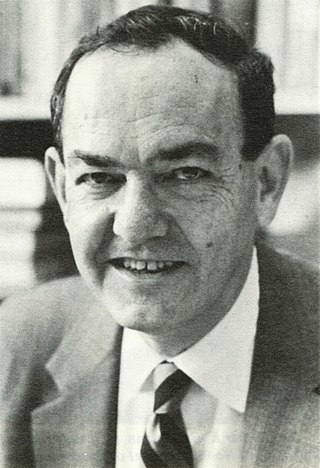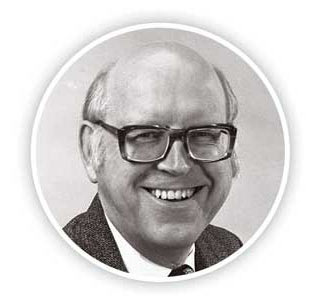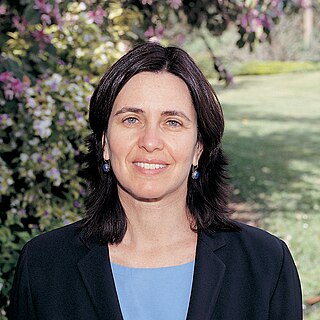Related Research Articles

Herbert Alexander Simon was an American political scientist whose work also influenced the fields of computer science, economics, and cognitive psychology. His primary research interest was decision-making within organizations and he is best known for the theories of "bounded rationality" and "satisficing". He received the Nobel Memorial Prize in Economic Sciences in 1978 and the Turing Award in computer science in 1975. His research was noted for its interdisciplinary nature, spanning the fields of cognitive science, computer science, public administration, management, and political science. He was at Carnegie Mellon University for most of his career, from 1949 to 2001, where he helped found the Carnegie Mellon School of Computer Science, one of the first such departments in the world.

The School of Computer Science (SCS) at Carnegie Mellon University in Pittsburgh, Pennsylvania, US is a school for computer science established in 1988. It has been consistently ranked among the best computer science programs over the decades. As of 2024 U.S. News & World Report ranks the graduate program as tied for No. 1 with Massachusetts Institute of Technology, Stanford University and University of California, Berkeley.

Allen Newell was an American researcher in computer science and cognitive psychology at the RAND Corporation and at Carnegie Mellon University's School of Computer Science, Tepper School of Business, and Department of Psychology. He contributed to the Information Processing Language (1956) and two of the earliest AI programs, the Logic Theorist (1956) and the General Problem Solver (1957). He was awarded the ACM's A.M. Turing Award along with Herbert A. Simon in 1975 for their contributions to artificial intelligence and the psychology of human cognition.
A cognitive tutor is a particular kind of intelligent tutoring system that utilizes a cognitive model to provide feedback to students as they are working through problems. This feedback will immediately inform students of the correctness, or incorrectness, of their actions in the tutor interface; however, cognitive tutors also have the ability to provide context-sensitive hints and instruction to guide students towards reasonable next steps.

Shafrira Goldwasser is an Israeli-American computer scientist and winner of the Turing Award in 2012. She is the RSA Professor of Electrical Engineering and Computer Science at Massachusetts Institute of Technology; a professor of mathematical sciences at the Weizmann Institute of Science, Israel; the director of the Simons Institute for the Theory of Computing at the University of California, Berkeley; and co-founder and chief scientist of Duality Technologies.
Mental Models is a book published by Lawrence Erlbaum Associates, Inc., in 1983 ISBN 0-89859-242-9. It was edited by Dedre Gentner and Albert L. Stevens, both employees of Bolt, Beranek and Newman, Inc. at the time. It appeared at about the same time as a book by the same name by Philip Johnson-Laird. According to the acknowledgment of the book, it resulted from a workshop on mental models held at the University of California, San Diego in October 1980, that was jointly sponsored by the Office of Naval Research and the Sloan Foundation.
John Robert Anderson is a Canadian-born American psychologist. He is currently professor of Psychology and Computer Science at Carnegie Mellon University.
Kenneth R. Koedinger is a professor of human–computer interaction and psychology at Carnegie Mellon University. He is the founding and current director of the Pittsburgh Science of Learning Center. He is widely known for his role in the development of the Cognitive Tutor software. He is also widely published in cognitive psychology, intelligent tutoring systems, and educational data mining, and his research group has repeatedly won "Best Paper" awards at scientific conferences in those areas, such as the EDM2008 Best Paper, ITS2006 Best Paper, ITS2004 Best Paper, and ITS2000 Best Paper.
Joseph Frederick Traub was an American computer scientist. He was the Edwin Howard Armstrong Professor of Computer Science at Columbia University and External Professor at the Santa Fe Institute. He held positions at Bell Laboratories, University of Washington, Carnegie Mellon, and Columbia, as well as sabbatical positions at Stanford, Berkeley, Princeton, California Institute of Technology, and Technical University, Munich.
Patricia Wenjie Cheng is a Chinese American psychologist. She is a leading researcher in cognitive psychology who works on human reasoning. She is best known for her psychological work on human understanding of causality. Her "power theory of the probabilistic contrast model," or power PC theory (1997) posits that people filter observations of events through a basic belief that causes have the power to generate their effects, thereby inferring specific cause-effect relations.

Gary Lee Miller is a professor of Computer Science at Carnegie Mellon University, Pittsburgh, United States. In 2003 he won the ACM Paris Kanellakis Award for the Miller–Rabin primality test. He was made an ACM Fellow in 2002 and won the Knuth Prize in 2013.

David Klahr is an American psychologist whose research ranges across the fields of cognitive development, psychology of science, and educational psychology and has been a professor at Carnegie Mellon University since 1969. He is the Walter van Dyke Bingham Professor of Cognitive Development and Education Sciences at Carnegie Mellon University and a member of the National Academy of Education, a Fellow of the American Psychological Association, a Charter Fellow of the Association for Psychological Science, on the Governing Board of the Cognitive Development Society, a member of the Society for Research in Child Development, and the Cognitive Science Society. He was an associate editor of Developmental Psychology and has served on the editorial boards of several cognitive science journals, as well as on the National Science Foundation's subcommittee on Memory and Cognitive Processes, and the National Institutes of Health's Human Development and Aging Study Section.

Kathleen M. Carley is an American computational social scientist specializing in dynamic network analysis. She is a professor in the School of Computer Science in the Carnegie Mellon Institute for Software Research at Carnegie Mellon University and also holds appointments in the Tepper School of Business, the Heinz College, the Department of Engineering and Public Policy, and the Department of Social and Decision Sciences.
James G. Greeno was an American experimental psychologist and learning scientist whose research focused on learning and problem solving with conceptual understanding, using scientific concepts and methods of association theory, computational cognitive modeling, and discourse analysis.
Alexei "Alyosha" A. Efros is a Russian-American computer scientist and professor at University of California, Berkeley. He has contributed to the field of computer vision, and his work has been referenced in Wired, BBC News, The New York Times, and The New Yorker.
Michelene (Micki) T. H. Chi is a cognitive and learning scientist known for her work on the development of expertise, benefits of self-explanations, and active learning in the classroom. Chi is the Regents Professor, Dorothy Bray Endowed Professor of Science and Teaching at Arizona State University, where she directs the Learning and Cognition Lab.
Thomas L. Griffiths is an Australian academic who is the Henry R. Luce Professor of Information Technology, Consciousness, and Culture at Princeton University. He studies human decision-making and its connection to problem-solving methods in computation. His book with Brian Christian, Algorithms to Live By: The Computer Science of Human Decisions, was named one of the "Best Books of 2016" by MIT Technology Review.

Frederick Reif was an American physicist. He was an emeritus professor in physics and psychology at Carnegie Mellon University.
References
- ↑ Analyzing William C. Martin, Godfrey Franklin (1998). Multicultural Teaching and Learning Styles. p. 36
- ↑ Baeza-Yates, Ricardo, and Berthier Ribeiro-Neto. "Modern information retrieval." Vol. 463. New York: ACM press, 1999.
- ↑ Ware, Colin. Information visualization: perception for design. Elsevier, 2012.
- 1 2 Curriculum Vitae: Jill H. Larkin, 1978. Accessed December 4, 2015.
- ↑ "Fellows". John Simon Guggenheim Memorial Foundation. Archived from the original on October 6, 2012. Retrieved June 11, 2024.
- ↑ Jill H. Larkin at DBLP Bibliography Server